SUMMARY
This is AI generated summarization, which may have errors. For context, always refer to the full article.
![[OPINION] The urgency for genuine party-lists](https://www.rappler.com/tachyon/2022/05/urgency-genuine-partylist-may-8-2022-1.jpg)
The Philippine party-list system is a mechanism that ought to strengthen democracy and legislative representation. In the past decades, party-lists serve to check and balance the dominant elite bloc in our legislature. However, its current state impedes genuine and legitimate party-lists from serving this critical function. In the age of democratic backsliding, we are in urgent need of genuine party-lists that will legislate for the interest of the broader masses and good governance.
Marginalized representation vs. proportional representation
The original intention of the party-list system, as articulated in the 1987 Constitution, was to promote proportional representation in the legislature by allowing for an election of one national party-list in Congress apart from the representatives elected at the district level. But through the years, party-lists have gone beyond their original purpose and served as legislative vehicles for various social and regional sectors. Activists, and even the Philippine Supreme Court, advocated for the notion that party-lists ought to exclusively work to represent marginalized sectors. Others contested this idea and asserted that party-lists should serve as springboards for political party development — something that Philippine democracy could really benefit from. Proponents of this idea thus argue that party-lists should not be limited to representing the marginalized, and in lieu, should empower and strengthen small parties to transition from the margins to the center.
This debate has been going on for two decades already. In 2001, the Supreme Court ruled that party-lists are intended to “to benefit those who have less in life” and should thus exclusively be for marginalized sectors. This ruling was reversed in 2013 when the High Court ruled that “national parties or organizations do not need to organize along sectoral lines and do not need to represent ‘any marginalized and underrepresented sector.’” In this ruling the SC invoked that the 1987 Constitution never meant to close the party-list system for sectoral representation but to facilitate proportional representation by allowing voters to vote for a party-list in the legislature on the national level, apart from the district representative that they vote on the local level.
The point of agreement between these opposing sides is that party-lists ought to foster strong legislative representation in a Congress otherwise filled by politicians coming from the ruling class. Party-lists in Congress have no doubt functioned as a critical mass in the legislative hall that is filled with politicians coming from big money and political dynasties. In times of democratic backsliding, the urgency of the critical mass and opposition that have emanated from grassroots and progressive groups that turned themselves into party-lists cannot be overstated.
The disaster that was Rodrigo Duterte
The Duterte regime is a disaster for the check and balances that the system of three co-equal branches of government was supposed to ensure. Having the executive branch function according to his whims was a given. However, shortly after Duterte’s victory in 2016, his allies in Congress bragged about having secured a supermajority. In June 2016, then House Speaker and ally of Rodrigo Duterte, Pantaleon Alvarez, proclaimed that more than 200 of the 290 lawmakers expressed their intention to join the bloc of the administration and that lawmakers who were members of the Liberal Party (the party of the Duterte’s electoral opponent Mar Roxas) supported the speakership of Alvarez.
Political turncoatism is a phenomenon that is almost unique in the Philippine setting. It is not unusual for politicians, especially on the local level, to change parties depending on which party is the ruling one. However, it was during the presidency of Rodrigo Duterte that we witnessed such a massive exodus of lawmakers toward the ruling party, to the point that no viable opposition was constituted to counter the force of the administration in the lower house. Indeed, even the militant Makabayan bloc was inclined to joining the supermajority during the early days of the Duterte presidency. Duterte’s hold on the legislature was further solidified in the 2019 midterm elections. After the sheer loss of members and machinery at the onset of the Duterte presidency, the opposition’s Otso Diretso slate failed to win a single Senate seat. This was a feat not even the dictator Ferdinand Marcos was able to achieve.
While there are certain advantages in having a strong legislative backing for presidents, completely undermining the check and balances that is guaranteed by a viable and competent opposition is also detrimental to democracy. In the case of the Duterte administration, for example, having a strong legislative backing allowed him to railroad some bills like the non-extension of franchise to ABS-CBN, additional taxes on tobacco and alcohol, postponement of barangay and Sangguniang Kabataan polls, and the changes in the franchise of DITO Telecommunications. Interestingly, some of the campaign promises of Duterte that were approved by his supermajority in Congress like the end of labor contractualization and the trust fund for coconut farmers were vetoed by him when it reached his desk. No further effort from Congress to reverse the presidential veto was made.
But apart from the lack of viable opposition forces in the legislature, there was another unique phenomenon that hounded the party-list system in the time of Duterte regime. In the same fashion that the Duterte administration spread its power over the two other branches of government, known Duterte appointees, allies, and supporters, who did not have any prior party-list engagement, built their own party-lists and forayed into the race. These party-lists include Duterte Youth, Mothers for Change (MOCHA), ACT as One, and Frontliners Ang Bida. These party-lists have, as their nominees, known Duterte supporters and appointees such as Mocha Uson, Celine Pialogo, and Ronald Cardema (later disqualified for rules on age limits for youth PL representatives).
In the claws of dynasts, big money, and Duterte allies
Duterte’s bane to our democracy is just the tip of the iceberg. The elitism in Philippine politics has no doubt enabled Duterte to wreak havoc on our most important democratic institutions. The embeddedness of trapos and political dynasties in Philippine politics spilled over to the party-list system that was put in place to counter them. For the 2022 election, Party-List Watch estimates that almost half of the 177 party-lists running this election are operated by and/or affiliated with political dynasties.
But apart from the dominance of dynasties, the elitism of our politics further affects the party-list system as demonstrated in the proliferation of party-lists that potentially represent elite interests, like those which are identified with big business, and former politicians and government officials that use party-lists as back doors to re-enter politics. Party-List Watch estimates that 36 party-lists running this election are identifiable with ex-politicians and 26 are associated with big business.
The elite invasion of the party-list system works against Philippine democracy because it shrinks the already small space granted to small political parties, civil society, people’s organizations, and progressive groups. Moreover, the trapo takeover further fuels the disillusionment of ordinary people towards politics. Seeing that even the space dedicated for a more profound people’s participation in government is occupied by the same trapos and dynasts that run as district representatives, people see no reason to meaningfully engage in party-list elections. This is best demonstrated in the 2019 elections where 37.7% of voters opted out of voting for a party-list. This was double the 20% of voters who did not vote for a party-list in 2016.
For 2022, election surveys remain to be a grim picture for party-lists. In the last Pulse Asia survey prior to the May 9 polls, 7 out of the top 10 party-lists are included in the dynastic party-lists identified by Party-List Watch.
Detecting fake party-lists and choosing the right ones
In the midst of democratic backsliding, as demonstrated in the outrageous showing of Marcos Jr. in the surveys and the election of Rodrigo Duterte in 2016, Filipino voters should be more discerning in choosing their representatives in Congress. Each voter is allowed to vote for two members of the House of Representatives. That district representatives are mostly hailing for political dynasties is a foregone conclusion. But party-lists are there to give us a chance for proper representation, where we vote for parties and not for personalities, and where ordinary Filipinos are given the chance for proper empowerment. Voters ought to not waste this vote. In choosing who to vote for in the party-list watch, Party-List Watch offers a 4-way test in flagging party-lists who are representing the interests of the elite.
- Is the party-list run by or identified with political dynasties?
- Does the party-list have a track record of representing and championing sectors?
- Is the party-list run by big money?
- Is the party-list identified with personalities and figures who were involved in corruption and human rights violations?
In identifying which party-list to vote for, voters can simply reverse these questions. Party-lists should be run by people’s organizations that have solid track records in championing sectors and advocacies. They should not be in the clutch of big money and dynasties, and without any trace of controversy that taints their integrity.
At this critical juncture in our democracy, no vote should be wasted. – Rappler.com
Vec Alporha teaches History at the University of the Philippines Los Baños. She acquired her MA in History from UP Diliman and her BA in Social Science (History-Political Science) from UP Baguio. She is also a host of PODKAS: Conversations on Philippine History, Politics, & Society.
Add a comment
How does this make you feel?
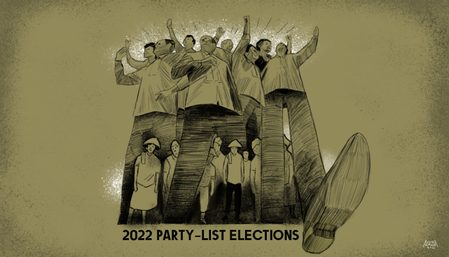

![[EDITORIAL] Hindi family business ang demokrasya natin](https://www.rappler.com/tachyon/2022/03/animated-political-dynasty-vote-buying-carousel-2.jpg?fit=449%2C449)
![[WATCH] In The Public Square with John Nery: Preloaded elections?](https://www.rappler.com/tachyon/2023/04/In-the-Public-Square-LS-SQ.jpg?resize=257%2C257&crop=414px%2C0px%2C1080px%2C1080px)
![[Newspoint] 19 million reasons](https://www.rappler.com/tachyon/2022/12/Newspoint-19-million-reasons-December-31-2022.jpg?resize=257%2C257&crop=181px%2C0px%2C900px%2C900px)

![[OPINION] The long revolution: Voices from the ground](https://www.rappler.com/tachyon/2022/06/Long-revolution-June-30-2022.jpg?resize=257%2C257&crop=239px%2C0px%2C720px%2C720px)
![[OPINION] I was called a ‘terrorist supporter’ while observing the Philippine elections](https://www.rappler.com/tachyon/2022/06/RT-poster-blurred.jpeg?resize=257%2C257&crop_strategy=attention)
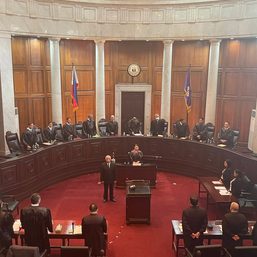
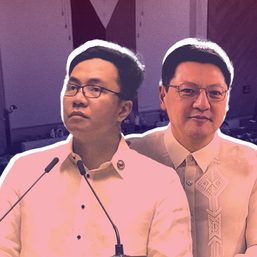
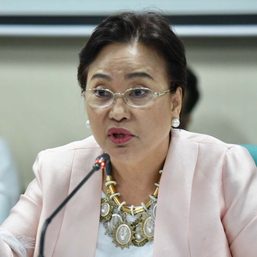
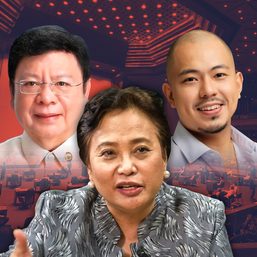

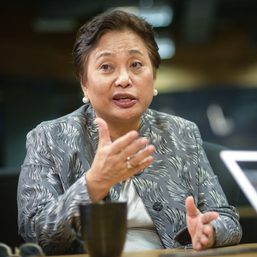
![[OPINION] Fiscal firestorm and the confident crusaders for transparency](https://www.rappler.com/tachyon/2023/10/fiscal-firestorm-confident-crusaers-transparency-october-3-2023.jpg?resize=257%2C257&crop_strategy=attention)
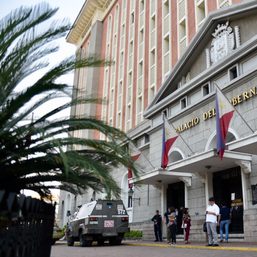
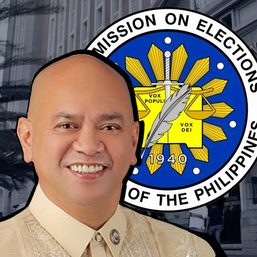
There are no comments yet. Add your comment to start the conversation.